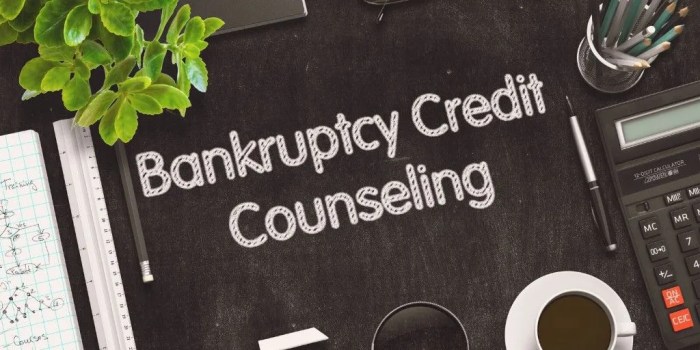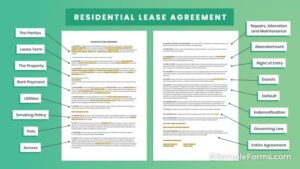
Bankruptcy counseling is like a lifebuoy tossed to a drowning sailor in the stormy seas of debt. It’s here to guide you through the murky waters of financial despair, helping you understand the ins and outs of bankruptcy before and after you hit the panic button. Think of it as your personal financial coach, ready to share strategies, support, and maybe even a chuckle as you navigate your way to brighter shores.
So, what’s the scoop on bankruptcy counseling? It’s not just about filling out forms and crossing your fingers; it’s about arming yourself with knowledge and tools to take control of your financial future. From the differences between pre-filing and post-filing counseling to discovering the magic of certified counselors, we’re about to unlock the secrets of financial survival.
Understanding Bankruptcy Counseling

Bankruptcy counseling might sound like a secret club for financial wizards who can magically make debts disappear, but it’s really about helping people facing financial trouble find their way back to solid ground. It’s a structured process that offers guidance and support when life throws financial curveballs. Think of it as a financial GPS for those lost in the wilderness of debt.The purpose of bankruptcy counseling is to ensure individuals fully understand their financial situation and the implications of filing for bankruptcy.
The process typically involves meeting with a certified counselor who will assess your financial health, discuss your options, and provide a plan tailored to your circumstances. Counselors are like the friendly neighborhood superheroes of finance, here to save the day with their expertise and impartial advice.
Differences Between Pre-Filing and Post-Filing Counseling
Understanding the distinction between pre-filing and post-filing counseling is crucial for anyone navigating the bankruptcy maze. Each type serves a specific purpose during the bankruptcy process, and knowing the difference can save you from potential pitfalls.Pre-filing counseling occurs before an individual formally files for bankruptcy. This session is mandatory and usually must be completed within six months prior to filing.
The counselor will review your financial situation, discuss alternatives to bankruptcy, and provide you with a certificate that proves you’ve completed the counseling. Essentially, it’s like a financial warm-up before the big game—preparing you for the filing process.Post-filing counseling, on the other hand, happens after the bankruptcy case has been filed. This session is also required and aims to help you understand the next steps and the importance of budgeting and managing finances post-bankruptcy.
It reinforces the lessons learned during the pre-filing phase and ensures that you don’t make the same mistakes again. It’s like attending a financial boot camp after you’ve enlisted in the debt relief army.
Role of Certified Counselors in Bankruptcy Proceedings
Certified counselors play a pivotal role in bankruptcy proceedings, acting as the guiding stars in your financial constellation. These professionals are equipped with the knowledge and training to help individuals navigate the complex and often overwhelming world of bankruptcy.The role of certified counselors includes:
- Assessing your financial situation to offer personalized advice.
- Educating you about the bankruptcy process, including its implications and potential outcomes.
- Helping you to explore alternatives to bankruptcy, such as debt management plans or credit counseling.
- Providing support throughout the process to alleviate stress and confusion.
- Ensuring that you are aware of your rights and responsibilities under bankruptcy law.
In addition, certified counselors offer a safe space for individuals to voice their concerns and fears about financial struggles. They often become trusted allies, providing invaluable resources and support as you embark on your journey toward financial recovery.
“Bankruptcy counseling isn’t just about filing papers; it’s about reclaiming your financial destiny one step at a time.”
So, remember, whether you’re gearing up to file or trying to pick up the pieces after hitting rock bottom, certified counselors are your financial sidekicks, ready to assist you in battling the dragons of debt!
Financial Management Strategies

Understanding the art of financial management is akin to mastering a culinary recipe where the ingredients must blend perfectly to avoid a financial soufflé collapse. With the right strategies, you can whip up a delectable financial future that doesn’t leave a bad taste in your mouth. Below, we explore some effective methods for tackling debt, consolidating your finances, and ensuring your estate planning is as robust as a hearty stew.
Debt Consolidation Methods and Benefits
Debt consolidation can be compared to putting all your pesky sock puppets into one big drawer instead of having them scattered all over the house. It simplifies your financial life and can reduce stress like a spa day for your budget. This approach involves combining multiple debts into a single loan, often at a lower interest rate. Here are some effective methods and their perks:
- Personal Loans: A personal loan allows you to take out a fixed amount of money, which can then be used to pay off high-interest debts. This often results in lower monthly payments and a single payment schedule.
- Balance Transfer Credit Cards: Some credit cards offer promotional periods with 0% interest on balance transfers. This can be a great way to save on interest if you can pay off the balance before the promotional period ends.
- Home Equity Loans: If you have equity in your home, a home equity loan can provide significant funds at a lower interest rate. However, this does come with the risk of putting your home on the line.
Debt consolidation not only makes your payments simpler but can also save you money in the long run. Just remember: it’s not a magic wand; it’s more like a good vacuum that helps clean up the mess.
Effective Debt Management and Relief Options
Effective debt management is like playing a strategic game of chess; every move counts, and one wrong step could lead to a checkmate in your financial plans. Establishing a solid strategy for managing debt is crucial. Here are some tips and options for relief worth considering:
- Budgeting Wisely: Create a detailed budget that tracks your income and expenses. This will help you identify unnecessary spending and allocate more funds toward debt repayment.
- Emergency Fund: Building an emergency fund can prevent you from falling back into debt when unexpected expenses arise. Aim for at least three to six months’ worth of expenses.
- Negotiating with Creditors: Don’t be shy; reach out to your creditors. Many are willing to negotiate payment plans or reduced interest rates if you ask politely.
- Credit Counseling Services: Consider seeking help from professional credit counselors who can provide guidance and create a debt management plan tailored to your needs.
By implementing these strategies, you’re not just managing debt; you’re conducting an orchestra of financial harmony.
Components of a Solid Estate Plan Involving Trusts
Creating a solid estate plan is like crafting a will with the finesse of a Shakespearean play; it requires careful thought, character development, and a dash of drama to ensure a happy ending. Trusts play a pivotal role in estate planning by allowing you to specify how your assets will be managed and distributed after your passing. Here are essential components to consider:
- Revocable Living Trust: This allows you to retain control over your assets while you’re alive and specify how they should be distributed after your death. It can also help avoid the lengthy probate process.
- Irrevocable Trust: Once established, this type of trust cannot be altered without the beneficiary’s consent. It’s useful for asset protection and can help reduce estate taxes.
- Healthcare Directive: This component ensures that your medical wishes are respected if you become incapacitated. It’s like giving a friend a detailed set of instructions for your favorite board game.
- Durable Power of Attorney: This legal document allows someone you trust to make financial or legal decisions on your behalf if you’re unable to do so yourself.
Incorporating these components into your estate plan ensures that your wishes are clearly Artikeld and your loved ones are taken care of, all while adding a touch of elegance to your financial legacy.
Credit and Financing Insights
When it comes to financial health, your credit score is like a digital trophy case: it showcases your financial behavior and can either dazzle lenders or leave them cringing. Understanding the nuances of credit counseling can be the secret sauce that turns your financial mess into a well-oiled machine. Armed with the right strategies, you can tackle your credit woes and navigate the murky waters of financing with finesse.
Importance of Credit Counseling
Credit counseling plays a crucial role in shaping your financial future. It’s the expert guidance that helps you understand your credit report, improve your score, and ultimately, manage your finances more effectively. Think of it as a personal trainer for your credit: it pushes you to lift those financial weights and get into shape. The impact of effective credit counseling can lead to lower interest rates, better loan terms, and a more robust understanding of your financial landscape.
“A good credit score is like a good pair of shoes: it carries you places you want to go.”
Leveraging Home Equity Loans Wisely
Home equity loans can feel like a financial lifebuoy, allowing you to tap into the equity you’ve built in your home. However, using this resource wisely is paramount. Here are some key strategies to consider before diving into the deep end:
Understand Your Equity
Before borrowing against your home, ensure you know how much equity you have. This figure is calculated by subtracting your mortgage balance from your home’s current market value.
Use for Necessary Expenses
Use these funds for home improvements or debt consolidation—expenses that will add value or help you save in the long run.
Consider the Risks
Remember, you’re putting your home on the line. If you can’t repay, you risk foreclosure, which is about as pleasant as stepping on a Lego in the dark. By wielding home equity loans responsibly, you can unlock the door to financial opportunities while still keeping your castle secure.
Leasing vs. Purchasing Financial Assets
Deciding between leasing and purchasing can feel like choosing between cupcakes and donuts—both delicious but with different consequences for your waistline (and wallet). Understanding the differences can help you make an informed decision when it comes to financial assets like cars or equipment. Let’s break it down: Leasing:
- Lower monthly payments that can feel like a steal.
- Often includes maintenance, which means fewer surprise bills.
- Great for those who love driving the latest model—like a kid in a candy store!
Purchasing:
- Ownership means you can customize to your heart’s content—hello, spiffy new paint job!
- No mileage limits, which is perfect for road trip enthusiasts.
- Resale value can be a financial benefit down the line, provided you treat your asset well.
In conclusion, whether you choose to lease or purchase, consider your lifestyle and financial goals. Each option carries its own unique blend of pros and cons, much like a good recipe that needs just the right amount of sugar and spice. It’s all about finding your financial flavor that suits your needs!
Last Word
In wrapping up our journey through the land of bankruptcy counseling, remember that you’re not alone on this rollercoaster ride – professional guidance is at your fingertips! With the right strategies and a sprinkle of humor, you can turn your financial woes into triumphs. So go ahead, take that leap into the world of financial awareness, and let your story of recovery begin!
Detailed FAQs
What is the purpose of bankruptcy counseling?
Bankruptcy counseling helps individuals understand their financial situation and explore options before filing for bankruptcy.
Who conducts bankruptcy counseling sessions?
Certified counselors, trained in financial management, conduct these sessions to provide guidance and support.
Is bankruptcy counseling mandatory?
Yes, for those filing for bankruptcy, counseling is required by law before filing a petition.
How long do bankruptcy counseling sessions usually last?
Typically, counseling sessions last around 60 to 90 minutes, depending on the complexity of your financial situation.
Can bankruptcy counseling help improve my credit score?
While it won’t directly improve your score, it can help you manage your debts better, potentially leading to an improved credit profile over time.





